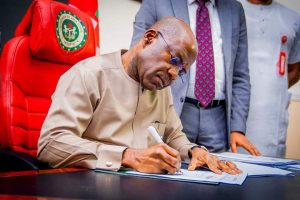Nigerians Vow to Resist Attempt to Muzzle Freedom of Speech and Expression Amid Social Media Regulation Bill

In a digital age where social media has become a powerful tool for freedom of expression and critique, a new move by the Federal Government of Nigeria to regulate these platforms has stirred quite a controversy. Netizens are determined to resist any attempts they believe might infringe on their freedom of speech.
The National Broadcasting Commission (NBC) set the stage for this debate when, on October 3, it presented a bill to the National Assembly, aiming to overhaul the 2004 NBC Act. If the bill becomes law, it would grant NBC the authority to oversee social media platforms.
During a discussion at the commission’s headquarters, Balarabe Ilelah, the Director-General of NBC, referred to the “ills of social media” as a “monster.” He emphasised the need for legal means to address issues arising from social media’s unregulated space.
This development has ignited a flurry of controversies, as many Nigerians are concerned that the government’s intentions could curb their fundamental human rights. Some believe that this is an attempt to stifle the rights to freedom of expression and privacy.
In response, the Socio-Economic Rights and Accountability Project (SERAP) has called upon Senate President Godswill Akpabio and House Speaker Tajudeen Abbas to reject the bill. SERAP claims that the proposed law could potentially criminalise Nigerians’ legitimate exercise of human rights, stating that it conflicts with the Nigerian Constitution and international human rights obligations.
The immediate past administration, led by former President Muhammadu Buhari, had previously tried to regulate social media due to concerns over fake news and user activities. However, these efforts met strong opposition from Nigerians.
In fact, the Federal Government suspended Twitter on June 4, 2021, alleging its involvement in supporting insurrection during the EndSARS protests. This move sparked a backlash from social media influencers, like Mathias Atule, who criticised it as an attempt to quash criticism.
Monica Adikwu acknowledges that some social media platforms may need regulation to curb inappropriate content, especially for young users. Still, she vehemently opposes any effort to limit constructive criticism and democratic discourse.
Osita Okechukwu, a former Director-General of Voice of Nigeria (VON), is optimistic that this bill will face resistance. He reminds us that democracy thrives on freedom of speech and expression, and draconian laws are not the solution to the challenges posed by social media.
In a digital age where the exchange of ideas happens at the click of a button, the battle for regulating social media in Nigeria is far from over. The government must carefully consider the balance between safeguarding against harmful content and preserving freedom of expression.
Source: Daily Post





